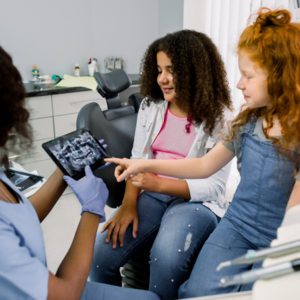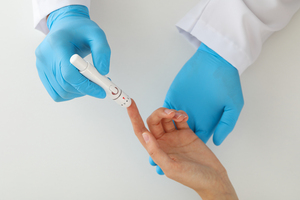Urgent care centers are equipped to handle a wide range of non-life-threatening medical issues—including dental emergencies. In fact, dental issues are a common complaint for patients who use urgent care, according to the Journal of Urgent Care Medicine. An urgent care clinic can help you get relief from symptoms and get an appointment with a specialist (such as a dentist or orthodontist).
When you arrive at urgent care, you will likely start at the registration area, which will include filling out intake paperwork and giving a brief description of your symptoms. The urgent care staff will then perform a physical exam and may order diagnostic tests, such as X-rays, to determine the cause of your dental issue. Depending on the severity of your condition, you may be treated on-site or referred to a specialist for further care.
Common Dental Issues
If you are experiencing a dental problem, going to an urgent care clinic could be a great way for you to get the care you need. Here are some common dental issues that you may be able to find care for at an urgent care clinic near you.
Toothaches
Toothaches are a common dental issue that can be caused by a variety of factors, such as tooth decay, gum disease, or a cracked tooth. If you are experiencing a toothache, you may feel pain or sensitivity in the affected tooth or around the affected area, according to the Journal of American Dental Association (JADA). You may also experience swelling or a fever. At urgent care, a healthcare professional can diagnose the probable cause of your toothache and in some cases provide pain relief until you can get permanent treatment such as a filling or root canal.
Broken or Chipped Teeth
Broken or chipped teeth can be caused by a variety of factors, such as trauma or biting down on something hard, according to Delta Dental. If you have a broken or chipped tooth, you may experience pain or sensitivity in the affected tooth or around the affected area. Urgent care centers can often assess the damage and provide temporary treatment until you are able to see a dental professional.
Lost Fillings or Crowns
Lost fillings or crowns can be caused by a variety of factors, such as decay or wear and tear. If you have lost a filling or crown, you may experience pain or sensitivity in the affected tooth or around the affected area, according to Alivio Dental. Getting care at an urgent care clinic can be a good choice for temporary pain relief and referral to a dentist who can repair the filling or crown.
Abscessed Tooth
An abscessed tooth is a serious dental issue that occurs when a pocket of pus forms around the root of a tooth, according to the Mayo Clinic. Symptoms of an abscessed tooth include:
- Severe pain that can include your jawbone, neck, or ear
- Pain or sensitivity with hot or cold temperatures
- Pain or discomfort while chewing
- Fever
- Swelling in the face, cheek, or neck
- Foul breath
Seeing a dentist or other medical provider promptly is important, according to the Mayo Clinic, because an untreated abscess can lead to a deeper infection. Many times pain relief and antibiotics are needed for the treatment of an abscess, according to the Mayo Clinic. Providers at urgent care can help you with this.
Gum Infections
Gum infections (also known as periodontitis) can be caused by a variety of factors, including poor oral hygiene. If you have a gum infection, you may experience pain, swelling, or bleeding in the affected area, according to the Mayo Clinic. Urgent care clinics may be able to help you by providing you with pain relief and antibiotics if necessary.
Can Urgent Care Handle Dental Issues?
Urgent care clinics are not a replacement for regular dental check-ups, and they usually cannot do many dental procedures like fillings and root canals. However, they can help you manage your symptoms and make referrals to specialized care.
Some dental treatment options that may be offered at urgent care include:
- Pain relief for toothaches
- Packing and pain relief for broken or cracked teeth
- Packing and pain relief for knocked-out teeth
- Pain relief and antibiotics for abscesses
- Pain relief and antibiotics for gum infections
- Pain relief for jaw pain
- X-rays and other diagnostic tests
Urgent Care vs. Dental Office
While urgent care clinics can help you get on the path to recovery for many dental issues, they are not a replacement for regular dental check-ups. Here are some differences between urgent care and dental offices, according to JUCM:
Urgent Care | Dental Office |
Can help provide relief during emergencies | Provides regular dental check-ups and treatments |
Walk-in appointments are usually available | Typically requires appointments |
May not have specialized dental equipment | Has specialized dental equipment |
May not have a dentist on staff | Has a dentist on staff |
Cannot do major dental work like fillings, extractions, root canals, etc… | Can do major dental work like fillings, extractions, root canals, etc… |
When to go to Urgent Care vs. a Dental Office
If you're experiencing a dental emergency, it can be difficult to know whether to go to urgent care or a dental office. Here are some general guidelines from the Cleveland Clinic:
Go to urgent care if:
- You are having difficulty getting in to see a dentist
- You're experiencing severe tooth or jaw pain
- You have a knocked-out tooth
- You have a broken or cracked tooth
- You have symptoms of an abscess or infection
- You're experiencing a new and persistent jaw pain
Go to a dental office if:
- If you think you need a dental procedure
- You need a regular check-up or cleaning
- You need a filling or other dental work
- You need a tooth extracted or a root canal
- You need braces or other orthodontic work
Remember, if you're not sure where to go, you can always call your dentist or an urgent care center for advice.
What to Expect at Urgent Care for Dental Issues
If you are experiencing a dental emergency, an urgent care clinic may be the best place for you to seek treatment. Here's what you can expect during your visit:
Examination and Diagnosis
When you arrive at urgent care, the healthcare provider on staff will examine your mouth and teeth to determine the cause of your dental issue. They will also ask you about your symptoms, medical history, and any medications you are currently taking. Lastly, the provider may order X-rays or perform other diagnostic tests to help diagnose your condition.
Pain Management
If you are experiencing pain, your urgent care provider will work with you to manage your discomfort. They may prescribe pain medication or recommend over-the-counter pain relievers, depending on your situation. In some cases, they may also administer a local anesthetic to numb the affected area.
Antibiotics and Other Medications
If your dental issue is caused by an infection, the provider may prescribe antibiotics to help clear up the infection. They may also prescribe other medications to help manage your symptoms or prevent complications.
Referral to a Dental Specialist
Your urgent care provider may refer you to a dental specialist for further treatment. This may be necessary if your condition requires more specialized care, such as oral surgery or orthodontic treatment.
Tips for Preventing Dental Emergencies
Maintaining good oral health is the first step in preventing dental emergencies according to the American Dental Association (ADA). Here are some more ways you can prevent dental emergencies:
Regular Dental Check-Ups
Visiting your dentist regularly is an important part of maintaining good oral health, according to the ADA. Your dentist can help identify any dental problems early on and may be able to treat them before they become more severe. It is recommended by the ADA to visit your dentist every six months for a routine check-up and cleaning.
Good Oral Hygiene
Practicing good oral hygiene is another great way to prevent decay that can lead to a dental emergency. The ADA recommends brushing your teeth at least twice a day with fluoride toothpaste and flossing daily. It is also recommended to use mouthwash to kill bacteria that brushing and flossing may have missed.
Wearing Protective Gear When Playing Sports
If you play sports it is important to wear protective gear to help prevent injuries, including dental-related injuries. Mouthguards are used in many sports to help protect your teeth and jaw from injury during contact sports.
The Connection Between Dental Care and Your Health
Dental health is an important part of your overall physical health. Neglecting your oral health can lead to serious issues such as gum disease, tooth decay, and even heart disease according to the ADA.
Maintaining good oral hygiene is crucial in preventing tooth decay, gum disease, and the integrity of your teeth. The ADA recommends brushing your teeth twice a day, flossing daily, and visiting your dentist at least twice a year for routine checkups and cleanings. Ignoring these recommendations leads to poor oral hygiene and can lead to more serious health issues such as heart disease, diabetes, and respiratory infections according to the ADA.
Dental Insurance
Dental insurance can help cover the costs of routine checkups, cleanings, and other dental procedures. It is important to check with your insurance provider to understand your coverage and any limitations or exclusions. Some insurance plans may require a waiting period before coverage begins or have annual maximums for coverage. Additionally, some plans offer full coverage or repayment for preventative care like routine cleanings, according to DentalPlans.com.
Common Dental Procedures and Treatments
There are many dental procedures and treatments that can help maintain or improve your oral health, according to the ADA. Some of these procedures include:
- Fillings
- Crowns
- Root canals
- Extractions
- Dental implants
Dental Specialists
In addition to general dentists, there are also dental specialists such as orthodontists, periodontists, and endodontists. These specialists have additional training and expertise in specific areas of dental care. There are also dental clinics that specialize in certain procedures or treatments.
How Technology Helps Dental Hygiene
Education on proper dental hygiene is key to maintaining good oral health. Your dentist can provide guidance on brushing and flossing techniques, as well as recommend products such as toothbrushes, toothpaste, and mouthwash.
DentistryIQ notes that advancements in dental technology have led to new products and procedures that can improve oral health. Some examples of dental technology include digital X-rays, laser dentistry, and Invisalign. There are also many dental products now available such as electric toothbrushes, water flossers, and teeth whitening kits.
Dental research is constantly evolving, leading to new trends and treatments. Some current trends according to DenistryIQ include minimally invasive dentistry, holistic dentistry, and regenerative dentistry. You may have heard of these trends through the many aspects of marketing. The dental industry is a competitive market, with many practices and clinics vying for patients. Some marketing strategies that many dentist practices use include social media, email campaigns, and search engine optimization on their websites. These strategies can help attract new patients and retain existing ones.
How Dentists Stay Up-To-Date With Best Practices
There are many dental associations and conferences that provide education and networking opportunities for dental professionals. The most prominent of these include the American Dental Association, International Association for Dental Research, and the Greater New York Dental Meeting.
Getting Dental Care at Urgent Care
It is important to seek prompt medical attention for dental issues because they can quickly become serious if left untreated, according to the ADA. Toothaches, for example, can be a sign of a more serious issue—such as an abscess or infection. Getting care at an urgent care clinic can not only help you avoid a more serious condition but also helps you get relief from agonizing pain and discomfort. Additionally, if you have a dental issue that requires specialized treatment, urgent care clinics can provide referrals to dental specialists.
However, it is important to remember that urgent care clinics are not a substitute for regular dental checkups. Regular dental checkups can help prevent dental issues from becoming emergencies in the first place.











